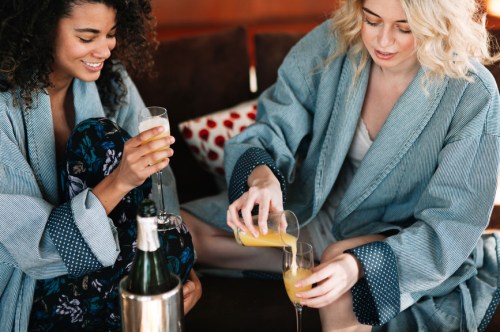Is There Any Truth to That ‘Hair of the Dog’ Method for Helping a Hangover?
A dietitian shares whether or not the hair of the dog method—aka drinking the morning after a boozy night—can actually help cure a hangover.

Picture it: a perfect summer day spent drinking with friends, hopping from brunch or a barbecue to your favorite bar, then back to your place for a nightcap. As the classic song goes, summertime and the livin’ is easy… that is, until you wake up with a raging hangover, a dry mouth that rivals the conditions of the Sahara, and the worst case of Sunday scaries in recent memory. You hobble over to the kitchen to pour yourself a glass of water—and then you spot your collection of prosecco while your jug of OJ in the fridge stares you in the face. Will a little “hair of the dog” mimosa give you the relief you desperately need to overcome your hangover, or will it just make things worse?
Experts in This Article
a certified dietitian, nutritionist, and founder of Real Nutrition NYC
To find out once and for all whether the hair of the dog method for hangovers is legit, we asked Amy Shapiro, MS, RD, CDN, of Real Nutrition in New York City.
But first, what causes hangovers?
A few things are at play when it comes to dreaded hangovers, which kick in as your body breaks down alcohol to return to its sober baseline status. For starters, Shapiro reminds us that alcohol is a diuretic, meaning it prompts more frequent urination and fluid loss, thus contributing to dehydration. “Being dehydrated can cause you to have a headache and feel tired, dizzy, and thirsty,” she says.
From there, Shapiro explains that excess alcohol intake disrupts electrolyte balance, doubling down on the symptoms of dehydration. “Alcohol intake can also lead to low blood sugar,” she adds, creating a triple whammy to make you feel like complete garbage and vowing to never imbibe again… or at least until the next weekend rolls around. “Finally, alcohol intake can disrupt sleep, and when we do not get enough sleep all of these symptoms are enhanced,” Shapiro says.
So can the hair of the dog help to prevent or alleviate a hangover?
Again, hangovers are a direct result of the process of metabolizing alcohol. While adding fuel to the flame won’t do you any favors in the long run, it *can* provide some short-term relief at most. “By drinking more alcohol, you will simply delay this effect and therefore not feel your hangover—that is, until you stop drinking at a later time,” Shapiro says. “Additionally, drinking alcohol is said to increase endorphins, which may potentially mask your hangover symptoms.” However, the operative word at play here is “mask,” which isn’t synonymous with “cure” or “prevent.”
Moreover, as a leading dietitian, Shapiro doesn’t endorse the hair of the dog method (or drinking to excess in any form, for that matter). Remember: Alcohol is still a toxin and your body registers it as such. In short, this popular hangover hack “doesn’t prevent a hangover, but will only delay it,” she reiterates. “And of course, it can also be dangerous.”
Hangover hacks that actually work, according to an RD
Since the hair of the dog will end up hurting rather than helping you in the hangover department, try giving these RD-approved hangover tips a (no pun intended) shot instead. Just note that you’ll need to put them into play both before and as you imbibe.
1. Avoid drinking on an empty stomach
To start, if you’re going to drink alcohol, it’s best to do so after eating a meal or a snack (at the very least). “I advise against drinking on an empty stomach,” Shapiro says. “I also recommend having some carbs with your meal prior to drinking, which will help slow the absorption of the alcohol.”
2. Keep water in your rotation
Never underestimate the benefits of staying hydrated, especially when hangovers are concerned. Again, remember that alcohol is a diuretic—so if you neglect to add H2O to the mix, your odds of getting hungover the next day will be all the more likely. “Alternate each alcoholic beverage with a glass of water,” Shapiro advises. You should also take care to hydrate before and after you sip on your liquor, wine, or beer of choice—or even opt for sparkling water and hydrating fruits as mixers.
3. Choose your alcohol wisely
Did you know that certain types of alcohol can potentially lead to stronger hangovers? As Shapiro says, “Darker drinks like red wine or whiskey tend to have congeners, which have been associated with worse hangover effects.” (FYI: Congeners are naturally occurring compounds other than ethanol that contribute to alcohol’s physiological effects.)
According to one medical review, bourbon is the highest congener beverage while vodka has few, if any, congeners. However, vodka still contains ethanol, and “ethanol effects per se had a considerably stronger effect on hangover than did congener content,” the review reads. In other words, while skipping dark drinks for lighter adult bevs *may* help to alleviate hangover severity, there are no guarantees.
4. Be safe and smart when drinking
Of course, this hangover tip is a no-brainer. On top of heeding the advice shared above, try your best to drink in moderation. Plus, if you know that certain types of alcohol, dietary habits, or other factors inevitably leave you feeling dizzy and nauseated the next day, notice your patterns and break the cycle. “Know your limit and get enough sleep,”says Shapiro. While all of these insights will help you in the long run, remember that the same can’t be said about reaching for the hair of the dog.
Sign Up for Our Daily Newsletter
Get all the latest in wellness, trends, food, fitness, beauty, and more delivered right to your inbox.
Got it, you've been added to our email list.










